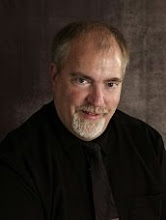You put your right brain in, you put your right brain out..

On my flight to Minneapolis and back this weekend I began to read a book that was highly recommended to us at the ACSI convention earlier this month. Daniel Pink, former speechwriter for none other than Al Gore, has written a book entitled A Whole New Mind: Why Right-Brainers will Rule the Future. As you probably know, the human brain is divided into two hemispheres. The left side of the brain controls the right side of the body, and vice versa. The left side of the brain is wired for logic, calculation, and reasoning. The right side of the brain is the side that controls artistic expression and creativity. Mr. Pink asserts that we are at the dawn of a new age in which right-brained thinking will be indispensable. Even as mankind moved from the Agricultural Age through the Industrial Age (when essential gifts for valuable labor were physical strength and stamina) up to the current Information Age (when everyone assumes that computer programming will be the most in-demand and best-paying job), so we now will be moving into the Conceptual Age, where design, synthesis, storytelling, and the ability to see the workings of a dynamic business as a symphony will prevail.
As an illustration of this, he cites automobiles and cell phones. Everyone, it seems, owns at least one. Therefore, in order to get new customers in a saturated market, it is not enough to focus on function. Rather, design and appearance are what really matters. Why else would someone spend more money on the face plate that goes on the phone than on the phone itself? People yearn for self-expression, which partly explains the incredible popularity of websites like myspace and facebook. However, rather than claiming that the world will be ruled by artsy types in black unitards and berets, the author demonstrates how vital it is for both hemispheres of the brain to be engaged in order to be a valuable leader in the new economy. It is an economy, after all, in which computer programmers in India will do the job for $15,000 per year, about what you might make monitoring the deep fryer at McDonald’s.
Human history is full of examples of the tension between left-brained and right-brained dominance. In ancient Greece, the Minoans were interested in the aesthetics of art and architecture; the Myceneans in the cold calculations of conquest. A little further down the road finds the same disparity between the militaristic Spartans and the Athenians who loved philosophy, drama, and politics. When was the last time a college team was nicknamed “the Athenians?” Yet they were right-brainers. The Romans were great engineers and builders, but for right-brained art and design, they preferred to copy the Greeks. At least the Romans understood the value of beauty, even if they were not particularly creative. The Renaissance opened the door to the Enlightenment, in which the great goddess of reason ruled in revolutionary France. But man is not just a left hemisphere, an automaton. The Romantic era came in reaction to that period, celebrating human emotion once again.
In the history of the United States, the story of the Great Awakening also illustrates how the left-brain/right-brain conflict affects religion and spirituality. Right-brainers claimed that the theological propositions of the “old light” preachers were dull and heartless, and turned to fiery preachers like Jonathan Edwards to strike fear into the hearers’ hearts and make them desperate for God’s salvation. In many cases, the dependence on emotional experience led to such excesses as uncontrollable shrieking, shaking, convulsing, rolling on the floor laughing, and the like.
Is there a correct balance to strike? I like to believe that the right side of my brain is hard at work, finding expression in music, drama, and even in writing a weekly blog. My left side is cool and rational and also works (most of the time) diligently so that common sense and logic will prevail. But my family would not enjoy a husband or father who expressed no emotion. Who would enjoy a leader without a sense of humor? Thank God for the right hemisphere, too!
Mr. Pink makes the observation that the American educational system is essentially geared toward the left brain. Who is qualified for college? Someone whose left brain can determine which bubble to fill in on the ACT or SAT. Let’s try an exercise in right-brained thinking this week. Try to come up with a humorous caption for the photo at the lead of this article. The winner will receive a coveted prize. Ready, set, create! And get ready to take your place as leaders in the new conceptual age.




